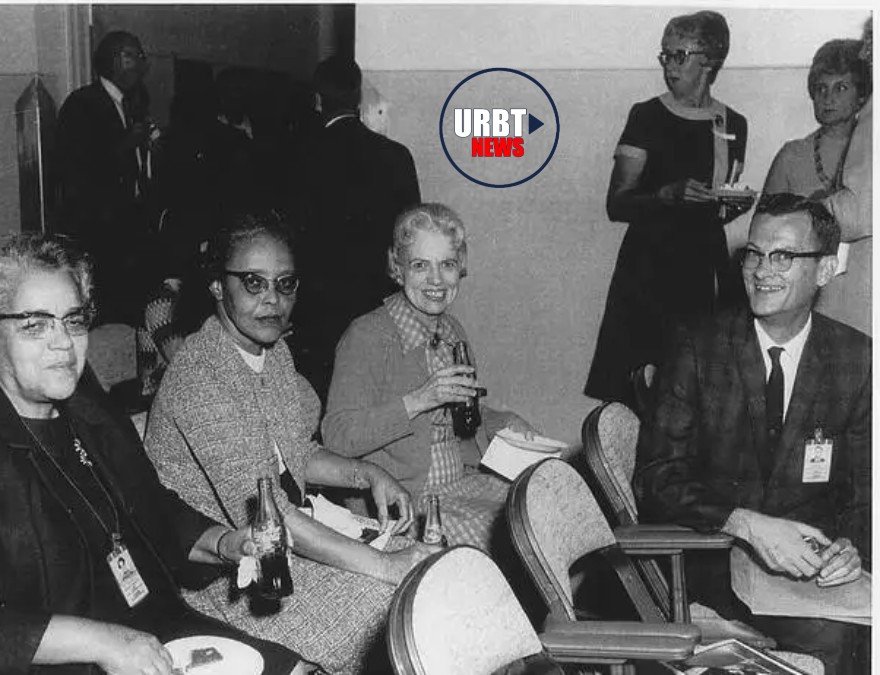Community News
Dorothy Vaughan The Unsung Heroine Who Paved the Way for Diversity at NASA
The True Hidden Figures at NASA.
Published
2 years agoon

Dorothy Vaughan The Unsung Heroine Who Paved the Way for Diversity at NASA. In an era where NASA is spearheaded by individuals from diverse backgrounds, it’s essential to remember the trailblazers who laid the groundwork for this inclusivity. One such pioneer is Dorothy Vaughan, an exceptional mathematician and NASA’s first African-American manager, whose contributions are often overlooked but profoundly significant.
Download the URBT News App from your App store. Apple / Andriod
Early Life and Career -Dorothy Vaughan The Unsung Heroine
Dorothy Vaughan was born on September 20, 1910, in Kansas City, Missouri. She graduated from Wilberforce University in Ohio in 1929, earning a degree in mathematics. Her early career involved teaching mathematics in Virginia, but her path took a pivotal turn during World War II when she joined the National Advisory Committee for Aeronautics (NACA) in 1943.
Date of Birth: September 20, 1910
Hometown: Kansas City, MO
Education: B.A., Mathematics, Wilberforce University, 1929
Hired by NACA: December 1943
Retired from NASA: 1971
Date of Death: November 10, 2008
Actress Playing Role in Hidden Figures: Octavia Spencer
Breaking Barriers at NACA
In 1949, NACA promoted Vaughan to lead its segregated West Area Computing Unit, making her the first black supervisor in the agency’s history. This role not only marked a personal achievement for Vaughan but also signaled a significant step toward diversity within the organization. She led a team of African-American female mathematicians, known as “human computers,” who performed complex calculations essential for aeronautical research and later for space exploration.
Champion of Equality
Vaughan’s leadership extended beyond technical prowess; she was a staunch advocate for the women in her unit. She ensured that her team received fair treatment and opportunities, intervening on behalf of both black and white women who deserved promotions or pay raises. Her advocacy helped pave the way for future generations of women at NASA, establishing a legacy of equality and empowerment.
Dorothy Vaughan The Unsung Heroine Collaboration and Contributions
Despite the racial and gender barriers of the time, engineers highly respected Vaughan’s work. She collaborated with well-known white computers such as Vera Huckel and Sara Bullock on significant projects, including the compilation of a handbook for algebraic methods for calculating machines. Engineers frequently sought her recommendations for the best personnel for challenging assignments, underscoring her expertise and respected judgment.
Legacy and Recognition
Dorothy Vaughan’s legacy is being recognized in various ways. NASA’s Johnson Space Center in Houston will honor her and the women of Apollo with activities celebrating their achievements. A renaming and ribbon-cutting ceremony at the center’s “Building 12” on July 19, the eve of the 55th anniversary of the Apollo 11 Moon landing, will commemorate Vaughan’s contributions and those of her peers.

1944 West Computing Center at NASA – Dorothy Vaughan The Unsung Heroine
Dorothy Vaughan’s story is a testament to perseverance, talent, and the fight for equality. Her pioneering role at NACA and later NASA not only broke racial and gender barriers but also laid the foundation for the diverse and inclusive workforce that defines the agency today. As we celebrate the milestones of space exploration, it is crucial to remember and honor the contributions of unsung heroes like Dorothy Vaughan, whose legacy continues to inspire future generations.

Dorothy Vaughan, NASA, NACA, African-American manager, human computer, diversity, equality, women in STEM, space exploration, Johnson Space Center, Apollo 11,
Trapped In Space – Astronauts Stranded on ISS – Read Now
Joseph Collins Jr. is currently leading several high-stakes initiatives that aim to transition Urban TV Network (URBT) from a niche broadcaster into a major global media and lifestyle conglomerate. Below are the key projects and recent activities defining his leadership in 2026: Project Phoenix: The WBD Acquisition Bid. The most ambitious current project under Collins’ direction is Project Phoenix. Building on his history of aggressive media acquisitions (including a previous $40 billion bid for WarnerMedia), Collins is currently spearheading a 2026 initiative to acquire assets from Warner Bros. Discovery. Strategy: The project involves an institutional investor proposal designed to integrate legacy entertainment assets into the URBT ecosystem. Goal: To establish a "community-driven" media giant where stockholders—of which URBT has over 13,000—act as a collective engine for corporate growth and audience engagement. Digital Expansion: URBT News 2026 In early 2026, Collins oversaw the rollout of the updated URBT News digital platform and mobile app. Focus: The app emphasizes "conservative diversity" and provides real-time reporting on urban culture, politics, and technology. Technical Edge: Collins has personally guided the development of the platform's content engine, utilizing modern web frameworks (React/Firebase) to ensure the network remains competitive in the fast-paced digital news cycle. J Collins Beverage Company Collins has branched out into the manufacturing and logistics sector with the J Collins Beverage Company. Products: The company is currently promoting Pure Balance Black Luxury Water, marketed as a high-end, molecularly structured hydration product. Operations: Beyond consumer goods, the company operates as a co-packer and distributor, providing infrastructure and guidance for new beverage brands entering the marketplace. Market Performance & Original Programming Stock Activity: As of late February 2026, URBT (trading on the OTC Pink Sheets) has seen significant market volatility and interest, recently recording substantial percentage gains as investors react to the company’s expansion plans. Programming Budget: The network is currently executing a $500 million programming initiative for the 2025-2026 season, focused on original films and series that push the boundaries of urban storytelling and technical production. Community & Professional Ventures Collins remains deeply involved in high-level branding projects for his professional network. This includes developing promotional materials and keynote speaker branding for associates like Noah Coates, author of The Prayer Box Husband, further cementing his role as a brand-builder in the media space.








